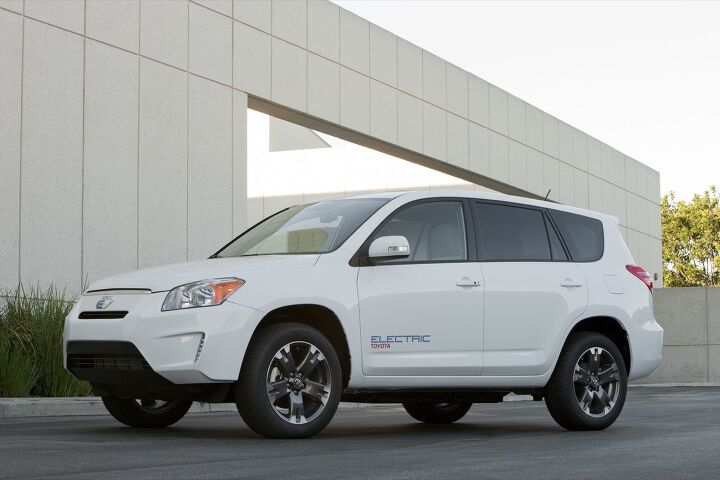Toyota Chairman: Shift to Electric Vehicles Will Not Be Rapid
Mazda is planning for the internal combustion engine of 2050. Toyota is applying the Dynamic Force improvements that worked wonders on the 2018 Camry’s fuel economy ratings to V6 and V8 engines.
And electric cars?
“We’re skeptical there would be a rapid shift to pure electric vehicles, given questions over user convenience,” Toyota chairman Takeshi Uchiyamada tells CNBC.
There is a Toyota electric car in your future, Uchiyamada believes. But more likely than not, it’s not in your near future.
Toyota was and continues to be at the forefront of hybrid development. Through the first seven months of 2017, for example, 49 percent of the hybrids and plug-in hybrids sold in the United States of America were Toyota products, according to HybridCars.com.
Toyota’s hybrid total alone — 126,155 vehicles during that period — was three times stronger than the overall sales total at Volvo, which recently made headlines with a plan that will see all new vehicle introductions involve hybrid or electric powertrains beginning in 2019.
But on the pure electric front, Toyota’s chairman believes a few more breakthroughs are needed on the technological front if battery-powered vehicles are to become fully capable. “I must say up front that we’re not against electric vehicles,” says Uchiyamada. “But in order for electric vehicles to cover long distances, they currently need to be loaded with a lot of batteries that take a considerable amount of time to charge.”
“There’s also the issue of battery life,” Uchiyamada says, who cites battery limitations as a key reason consumers aren’t embracing electric vehicles.
Toyota does not currently offer a pure EV in the United States. The Mirai is a hydrogen fuel cell vehicle. The Prius Prime is a plug-in hybrid with 25 miles of electric range. Those two vehicles account for slightly less than 1 percent of the 1,604,847 total vehicles sold by Toyota in the U.S. through the first two-thirds of 2017.
In the United States, the EV market accounts for 1 out of every 200 new vehicles sold. The overwhelming majority of those EV sales take place at three automakers: Tesla, Nissan, and Chevrolet.
[Images: Toyota]
Timothy Cain is a contributing analyst at The Truth About Cars and Autofocus.ca and the founder and former editor of GoodCarBadCar.net. Follow on Twitter @timcaincars.
More by Timothy Cain
Latest Car Reviews
Read moreLatest Product Reviews
Read moreRecent Comments
- Amy I owned this exact car from 16 until 19 (1990 to 1993) I miss this car immensely and am on the search to own it again, although it looks like my search may be in vane. It was affectionatly dubbed, " The Dragon Wagon," and hauled many a teenager around the city of Charlotte, NC. For me, it was dependable and trustworthy. I was able to do much of the maintenance myself until I was struck by lightning and a month later the battery exploded. My parents did have the entire electrical system redone and he was back to new. I hope to find one in the near future and make it my every day driver. I'm a dreamer.
- Jeff Overall I prefer the 59 GM cars to the 58s because of less chrome but I have a new appreciation of the 58 Cadillac Eldorados after reading this series. I use to not like the 58 Eldorados but I now don't mind them. Overall I prefer the 55-57s GMs over most of the 58-60s GMs. For the most part I like the 61 GMs. Chryslers I like the 57 and 58s. Fords I liked the 55 thru 57s but the 58s and 59s not as much with the exception of Mercury which I for the most part like all those. As the 60s progressed the tail fins started to go away and the amount of chrome was reduced. More understated.
- Theflyersfan Nissan could have the best auto lineup of any carmaker (they don't), but until they improve one major issue, the best cars out there won't matter. That is the dealership experience. Year after year in multiple customer service surveys from groups like JD Power and CR, Nissan frequency scrapes the bottom. Personally, I really like the never seen new Z, but after having several truly awful Nissan dealer experiences, my shadow will never darken a Nissan showroom. I'm painting with broad strokes here, but maybe it is so ingrained in their culture to try to take advantage of people who might not be savvy enough in the buying experience that they by default treat everyone like idiots and saps. All of this has to be frustrating to Nissan HQ as they are improving their lineup but their dealers drag them down.
- SPPPP I am actually a pretty big Alfa fan ... and that is why I hate this car.
- SCE to AUX They're spending billions on this venture, so I hope so.Investing during a lull in the EV market seems like a smart move - "buy low, sell high" and all that.Key for Honda will be achieving high efficiency in its EVs, something not everybody can do.



































Comments
Join the conversation
"Shift to Electric Vehicles Will Not Be Rapid" Shocking!
Japan Inc is in cahoots with oil companies in exchange for military protection. Japanese fuel cell research -> protection racket.